With just under two weeks to go until the 2023 Rugby World Cup kicks off in Paris, we're looking back at the history of the tournament from its origins in New Zealand and Australia 36 years ago, to its tenth instalment in France next month
This week, we're looking back at the 2015 tournament that was held in England for the second time.
If the 2011 tournament victory was achieved after something of an arm wrestle, New Zealand took the game to the next level at the showpiece four years later when lifting the trophy at Twickenham.
Hosts
England secured the rights after seeing off bids from Japan, South Africa and Italy. The host country was confirmed in 2009 with Japan named as the host nation for the 2019 tournament at the same time.
Wales had initially expressed an interest in hosting but after dropping out, supported England's bid with some games being held in the Millennium Stadium.
Gloucester's Kingsholm and Exeter’s Sandy Park were among 13 venues used, while London’s Wembley and Olympic Stadium were also chosen.
The football stadiums of Newcastle, Manchester City, Aston Villa, Leeds, Leicester, Brighton and MK Dons were also used during the tournament that attracted 2,600,741 fans to the games.
Ireland’s clash with Romania at Wembley saw the highest tournament attendance of 89,267.
Irish referees George Clancy and John Lacey were among the officials for the competition.
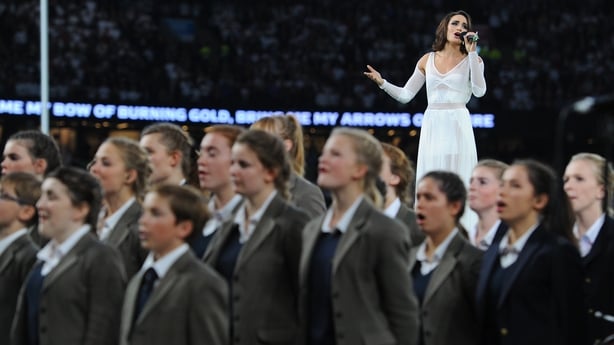
The story of the Rugby World Cup: All Blacks get over the line in 2011
Pools
Pool A: England, Australia, Wales, Fiji, Uruguay
Pool B: South Africa, Scotland, Japan, Samoa, United States
Pool C: New Zealand, Argentina, Georgia, Tonga, Namibia
Pool D: Ireland, France, Italy, Romania, Canada
The story of the Rugby World Cup: South Africa win in 07 as Ireland collapse
Ireland
Under Joe Schmidt, who took over from Declan Kidney after the 2013 Six Nations, in which Ireland won just one match, the team had recorded back-to-back Six Nations championship victories in 2014 and 2015.
While Brian O'Driscoll and Ronan O’Gara had retired, Johnny Sexton and Sean O’Brien were at the top of their game, while Paul O’Connell was proving a leader of exceptional influence.
They opened with routine victories over Canada in Cardiff and Romania at Wembley Stadium.
Italy, who had beaten Ireland two years previous in the Six Nations, provided stiffer opposition but a Keith Earls try helped Schmidt's men to a 16-9 victory in the Olympic Stadium; the win set up a pool decider against France in the Millennium Stadium.
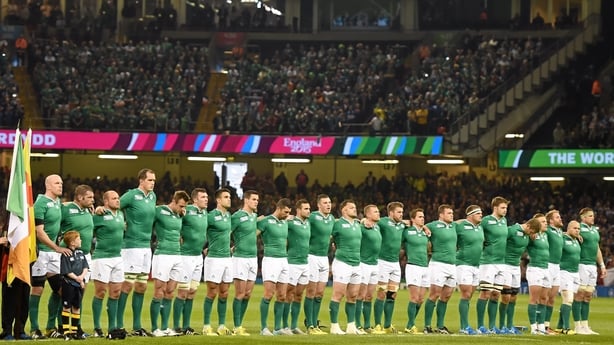
It was, by some measure, Ireland’s greatest World Cup performance.
Sexton kicked six points, Ian Madigan, who came on for Sexton in the 26th minute, kicked eight, while second-half tries from Rob Kearney and Conor Murray lifted the roof off the stadium.
Throughout, flanker Sean O’Brien, excelled in attack and defence.
But Ireland paid a price for the 24-9 win that they simply could not afford.
In a prescient RTÉ Sport column, former Ireland full-back Conor O’Shea wrote: "If we were in a boat, I feel like we have been holed beneath the water line."
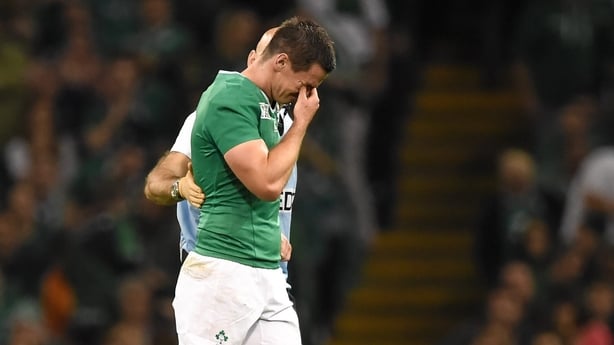
Alongside Sexton (above), Ireland lost Peter O’Mahony and O’Connell (an injury which ended his playing career), while man of the match O’Brien was banned for a needless punch into the midriff of Pascal Pape that was missed in-game.
While the country basked in the glory of the win, it soon became apparent that that the body count was going to be a huge issue with old nemesis Argentina, who had only lost to New Zealand 26-16 in the pool stages, awaiting.
Los Pumas burst out of the blocks and were 14-0 up by the 10th minute.
Luke Fitzgerald, who had replaced the injured Tommy Bowe in the 13th minute, scored one try and set up another for Jordi Murphy to get Ireland within six points with 11 minutes left, but as had happened in New Zealand four years previously, they ran out of gas.
Argentina scored two tries in the final stages and qualified for a semi-final for the second time in their World Cup history. They ended up losing the third place play-off to South Africa, while Ireland went back to the drawing board.
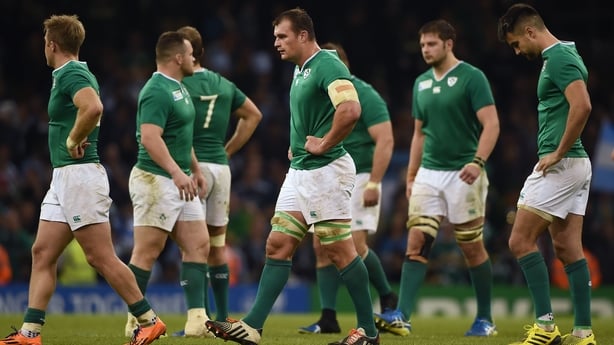
Ireland squad: Rory Best, Seán Cronin, Richardt Strauss, Tadhg Furlong, Cian Healy, Jack McGrath, Mike Ross, Nathan White, Iain Henderson, Mike McCarthy, Paul O'Connell (capt), Donnacha Ryan, Devin Toner, Chris Henry, Jordi Murphy, Seán O'Brien, Peter O'Mahony, Rhys Ruddock, Jamie Heaslip; Conor Murray, Isaac Boss, Eoin Reddan, Paddy Jackson, Ian Madigan, Johnny Sexton, Darren Cave, Keith Earls, Robbie Henshaw, Jared Payne, Tommy Bowe, Luke Fitzgerald, Dave Kearney, Simon Zebo,
Rob Kearney.
Results
Pool D: Ireland 50-22 Canada (19 September - Millennium Stadium, Cardiff)
Pool D: Ireland 44-10 Romania (27 September - Wembley Stadium, London)
Pool D: Ireland 16-9 Italy (4 October - Olympic Stadium, London)
Pool D: Ireland 24-9 France (11 October - Millennium Stadium, Cardiff)
Quarter-final: Ireland 20-43 Argentina (18 October - Millennium Stadium, Cardiff)
The story of the RWC: Jonny Wilkinson kicks England to glory in 2003
New Zealand, after a 24-year gap, had eventually got their hands back on the Webb Ellis Cup but after losing the weight off their shoulders they had a big target on their back.
If the final against France in 2011 was a flat beer, they brought the champagne rugby to the tournament in 2015.
Now under Steve Hansen, who took over from Graham Henry in 2012, New Zealand had won the Rugby Championship three times before 2015.
Hansen was named coach of the year in 2013 (when they won 14 of 14 Tests, rounding off the year with a famous 24-22 victory over Ireland in Dublin) and 2014.
"You carry the tag around, as a world champion," said Richie McCaw,. "Our job was to go and play like that."
That task was aided by the infusion of Brodie Retallick, Sam Cane, Dane Coles, Aaron Smith, Julian Savea and Beauden Barrett, while Dan Carter - injured in the pool stages in 2011 - was fit and raring to go.
As usual, the early games saw the All Blacks go through the gears, racking up 25 tries in wins over Argentina, Namibia, Georgia and Tonga.
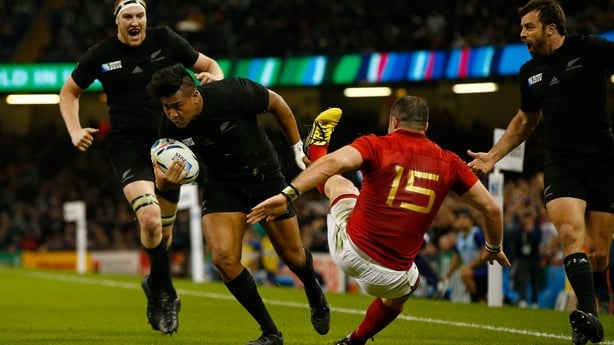
Savea scored his second hat-trick of the tournament when New Zealand thrashed France 62-13 in the quarter-final.
After suffering at the hands of Les Bleus in 1999 and 2007, the All Blacks showed no mercy, running in nine tries in a memorable clash in Cardiff.
"A special performance," said McCaw. "I knew after the first couple of minutes that the boys were right into this game."
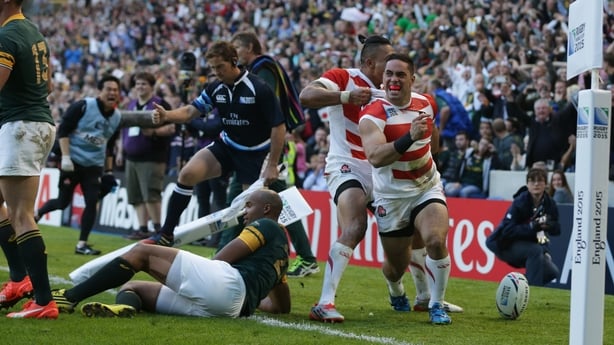
South Africa, stunned by the biggest World Cup shock ever when losing in the pool stages to Japan, had beaten Wales in the quarter-final, and awaited New Zealand in the semi-final, pushing the champions closer than anyone.
Jerome Kaino and Barrett scored tries with Carter kicking two conversions, two penalties and a drop goal to earn a 20-18 win.
Australia, under head coach Michael Cheika, had topped a pool containing Wales and England – their 33-13 victory over the hosts effectively knocking out the Red Rose.
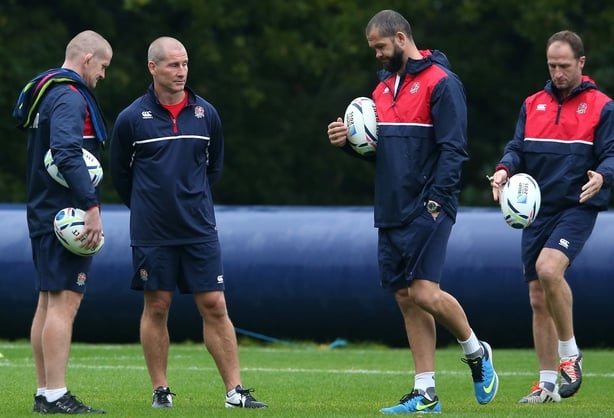
Incidentally, the fall-out from that early exit had and still has huge implications for Irish rugby with the England coaching team splitting up and finding new homes in Ireland. Head coach Stuart Lancaster later joined Leinster, Graham Rowntree joined Munster, while fellow assistants Mike Catt and Andy Farrell came into Joe Schmidt's backroom team.
The Wallabies accounted for the Pumas in the semi-final, Adam Ashley-Cooper scoring a hat-trick in a 29-15 win.
Australia had beaten New Zealand in the shortened Rugby Championship that August but that proved just a blip.
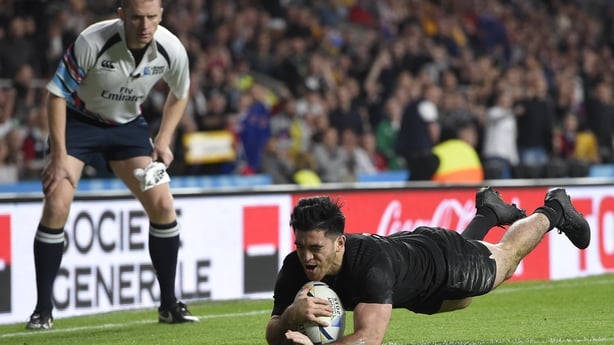
Tries from Nehe Milner-Skudder (above) and Ma’a Nonu saw New Zealand lead 21-3 early in the second half of the final in Twickenham in front of 80,125 fans, and it looked like their coronation would be a formality.
However, during a sin-binning for Ben Smith, the Aussies hit back with two converted tries from David Pocock and Tevita Kuridrani and it was game on, the 1991 and 1999 champions trailing by just four points with 11 minutes to play.
Carter dropped a long-range goal and added a penalty before Barrett applied the coup de grâce with a kick and chase finish.
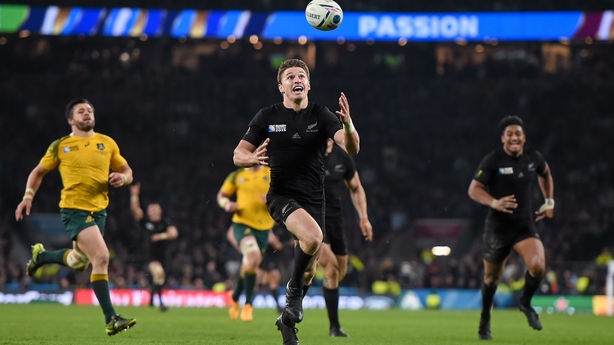
The greatest rugby team of all time enshrined their legacy by becoming the only side to win the Webb Ellis back-to-back.
"When the final whistle went – four years earlier it was pure relief - whereas in 2015 it was just satisfaction that we'd set out to do something that no team had done before and we were able to tick it off," said McCaw.
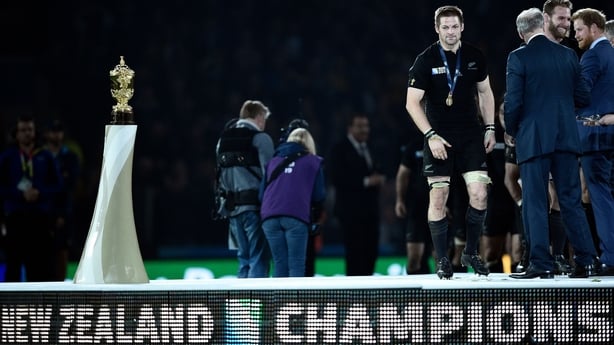
Top points scorers:
Nicolás Sánchez (Argentina): 97 points
Handre Pollard (South Africa): 93 points
Bernard Foley (Australia), Dan Carter (New Zealand): 82 points
Top try scorers:
Julian Savea (New Zealand): 8 tries
Nehe Milner-Skudder (New Zealand): 6 tries
Juan Imhoff (Argentina), JP Pietersen (South Africa), Bryan Habana (South Africa), Gareth Davies (Wales): 5 tries
Follow Ireland v Romania on Saturday 9 September (kick-off 2.30pm Irish time) via our live blog on RTÉ.ie and the RTÉ News app. Listen to live commentary on RTÉ Radio.


